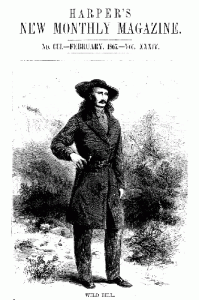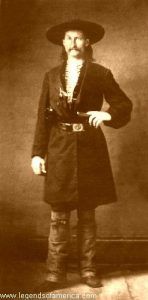Criticisms of George Ward Nichols Article “Wild Bill”
In February, 1867, an article entitled Wild Bill appeared in Harper’s New Monthly Magazine. Written by George Ward Nichols, the tale wildly exaggerated Bill Hickok’s deeds, defamed the people of Springfield, Missouri, and included numerous downright inaccuracies.
Response to the Nichols article was heavily attacked by the press, so much so, that Nichols soon turned away from this type of journalism and concentrated on writing about other things.
Even though the article was inaccurate and widely thought of as being little more than entertainment fodder for those in the East, it was still widely read and largely perpetuated Bill Hickok’s already growing legend.
Listed below are some of the excerpts regarding the article:
 From the Leavenworth Daily Conservative on January 30, 1867
From the Leavenworth Daily Conservative on January 30, 1867
The story of “Wild Bill,” as told in Harper’s for February is not easily credited hereabouts. To those of us who were engaged in the campaign, it sounds mythical; and whether Harry York, Buckskin Joe or Ben Nugget is meant in the life sketches of Harper we are not prepared to say. The scout services were so mixed that we are unable to give precedence to any. “Wild Bill’s” exploits at Springfield have not as yet been heard of here, and if under that cognomen such brave deeds occurred we have not been given the relation. There are many of the rough riders of the rebellion now in this city whose record would compare very favorably with that of “Wild Bill,” and if another account is wanted we might refer to Walt Sinclair.
From the Springfield Patriot on January 31, 1867
Springfield is excited. It has been so ever since the mail of the 25th brought Harper’s Monthly to its numerous subscribers here. The excitement, curiously enough, manifests itself in very opposite effects upon our citizens. Some are excessively indignant, but the great majority are in convulsions of laughter, which seem interminable as yet. The cause of both abnormal moods, in our usually placid and quiet city, is the first article in Harper for February, which all agree, if published at all, should have had its place in the “Editor’s Drawer,” with the other fabricated more or less funnyisms; and not where it is, in the leading “illustrated” place. But, upon reflection, as Harper has given the same prominence to “Heroic Deeds of Heroic Men,” by Rev. J. T. Headley, which, generally, are of about the same character as its article “Wild Bill,” we will not question the good taste of its “makeup.”
We are importuned by the angry ones to review it. “For,” say they, “it slanders our city and citizens so outrageously by its caricatures, that it will deter some from immigrating here, who believe its representations of our people.”
“Are there any so ignorant?” we asked.
“Plenty of them in New England; and especially about the Hub, just as ready to swallow it all as Gospel truth, as a Johnny Chinaman or Japanese would be to believe that England, France and America are inhabited by cannibals.”
“Don’t touch it,” cries the hilarious party, “don’t spoil a richer morceaux than ever was printed in Gulliver’s Travels or Baron Munchausen! If it prevents any consummate fools from coming to Southwest Missouri, that’s no loss.”
So we compromise between the two demands and give the article but brief and inadequate criticism. Indeed, we do not imagine that we could do it justice, if we made ever so serious and studied an attempt to do so.
A good many of our people – those especially who frequent the barrooms and lager-beer saloons, will remember the author of the article, when we mention one “Colonel” G. W. Nichols, who was here for a few days in the summer of 1865, splurging around among our “strange, half-civilized people,” seriously endangering the supply of lager and corn whisky, and putting on more airs than a spotted stud-horse in the ring of a county fair. He’s the author!
And if the illustrious holder of one of the “Brevet” commissions which Fremont issued to his wagon-masters, will come back to Springfield, two-thirds of all the people he meets will invite him “to pis’n hisself with suth’n” for the fun he unwittingly furnished them in his article – the remaining one-third will kick him wherever met, for lying like a dog upon the city and people of Springfield.
James B Hickok, (not “William Hitchcock,” as the “Colonel” misnames his hero,) is a remarkable man, and is as well known here as Horace Greeley in New York, or Henry Wilson in “the Hub.” The portrait of him on the first page of Harper for February, is a most faithful and striking likeness – features, shape, posture, and dress – in all it is a faithful reproduction of one of Charley Scholten’s photographs of “Wild Bill,” as he is generally called. No finer physique, no greater strength, no more personal courage, no steadier nerves, no superior skill with the pistol, no better horsemanship than his, could any man of the million Federal soldiers of the war, boast of; and few did better or more loyal service as a soldier throughout the war. But Nichols “cuts it very fat” when he describes Bill’s teats in arms. We think his hero only claims to have sent a few dozen rebs to the farther side of Jordan; and we never, before reading the “Colonel’s” article, suspected he had dispatched “several hundreds with his own hands.” But it must be so, for the “Colonel” asserts it with a parenthesis of genuine flavorous Bostonian piety, to assure us of his incapacity to utter an untruth.
From the Atchison Daily Champion on February 5, 1867
‘Wild Bill” is, as stated in the Magazine, a splendid specimen of physical manhood, and is a dead shot with a pistol. He is a very quiet man, rarely talking to anyone, and not of a quarrelsome disposition, although reckless and desperate when once involved in a fight. There are a number of citizens of this city who know him well.
Nichols’ sketch of ‘Wild Bill’ is a very readable paper, but the fine descriptive powers of the writer have been drawn upon as largely as facts, in producing it. There are dozens of men on the Overland Line who are probably more desperate characters than Hickok and are the heroes of quite as many and as desperate adventures. The Wild West is fertile in ‘Wild Bill’s.’ Charley Slade, formerly one of the division Superintendents on the O. S. Line, was probably a more desperate, as well as a cooler man than the hero of Harper’s, and his fight at his own ranch was a much more terrible encounter than that of ‘Wild Bill with the McKandles gang.
From the Kansas Daily Commonwealth on May 11, 1873
It is disgusting to see the eastern papers crowding in everything they can get hold of about “Wild Bill.” If they only knew the real character of the men they so want to worship, we doubt if their names would ever appear again. “Wild Bill,” or Bill Hickok, is nothing more than a drunken, reckless, murderous coward, who is treated with contempt by true border men, and who should have been hung years ago for the murder of innocent men. The shooting of the “old teamster” in the back for a small provocation, while crossing the plains in 1859, is one fact that Harpers correspondent failed to mention, and being booted out of a Leavenworth saloon by a boy bartender is another; and we might name many other similar examples of his bravery. In one or two instances he did the U. S. government good service, but his shameful and cowardly conduct more than overbalances the good.
Compiled and edited by Kathy Weiser/Legends of America, updated May 2021.
Also See:
McCanles Massacre – A WPA Interview
Rock Creek Station & the McCanles Massacre

